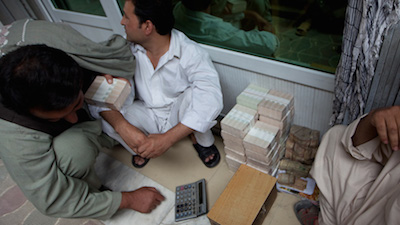NextBillion ‘Financial Health’ Relaunches with MetLife Foundation Backing
Monday, June 19, 2017

Stacks of cash are counted in an Afghan market.
NextBillion, the WDI-affiliated website focused on social entrepreneurship and venture development, has re-launched its financial inclusion blog with a new sponsor and a new name to better reflect the current thinking in the field.
The new site is called Financial Health and is sponsored by MetLife Foundation.
NextBillion Editor James Militzer said the term “financial inclusion” was fitting for the early days of the blog as the global community emphasized the need for wider access to financial services for underserved clients. But the sector’s focus has evolved over the years, with many now arguing that inclusion alone isn’t enough.
The latest thinking is that for people to be fully served by the financial services industry, access is only the beginning. People also must be able to balance income and expenses, accrue savings and handle debts, and have the tools to weather future financial storms.
“It has been fascinating to follow the evolution of financial inclusion in the four years since NextBillion launched our Financial Innovation blog,” Militzer said. “In that short time, the sector has really come into its own. But with the focus shifting from outputs, like the number of new accounts opened or used, to the actual impact of financial services on clients’ lives, it feels like the movement is undergoing a sea change. We’re looking forward to working with MetLife Foundation, their partner organizations, and our broader community of contributors around the world to chronicle the effects of these changes on financial services providers and their low-income clients.”
The MetLife Foundation has been an advocate for increased access to financial products for underserved populations. In a Q&A with Militzer, foundation President Dennis White talks about the organization’s work, the outlook for financial services in low-income communities, and his hopes for the site.
“We’d like it to be a site where people can go to find out what’s working, and importantly, what’s not working,” White said. “There needs to be an opportunity for both the good, and the not-so-good, to be discussed. And that’s incumbent upon funders and others in the field to make sure that’s shared.”
Photo courtesy of the Institute for Money, Technology and Financial Inclusion, via Flickr
